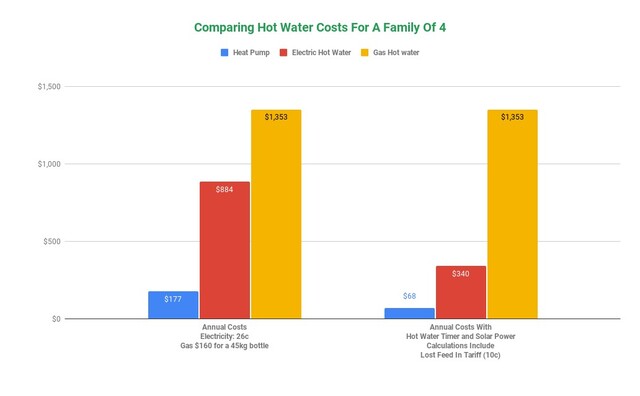Hot water is one of those things we use every day without giving it much thought—but it can be a big part of our energy bill, sometimes up to half of it! If you’re ready to save some serious cash or cut down on your environmental footprint, it’s time to rethink your hot water setup.
Gareth Duggan, an accredited solar designer and energy efficiency expert, has some solid advice when it comes to choosing the right hot water system.
He says, “When we think about spending money, it’s important to ask ourselves: what’s the next big thing we can do to have a positive environmental impact?”
If you have a gas hot water system, planning the replacement of your system should be high on your list.
Gas was once touted as the more environmentally friendly and cost effective choice, however, this thinking is now out of date. When we burn gas about 30 per cent of the heat is lost up the flue. Electric element hot water systems instead have an element in the water and 100 per cent of the energy is converted to hot water. Heat pumps are even more efficient again, using the same technology that air conditioners use. Heat pumps don’t produce heat, they pump it from one place to another. They use one unit of energy to pump 5 to 6 units of heat from outside into your hot water tank. This means they use less than 20 per cent of the energy of an electric hot water system and seven times less energy than a gas hot water system!
For those with solar power choosing an electric element hot water system or heat pump allows you to turn “your hot water system into a battery,” Gareth explains. “If you run it in the middle of the day, you’re effectively storing your solar energy in the form of hot water, which you can use at night or in the morning. It’s as easy as adding a timer.”
Gareth suggests setting your hot water system to kick on at 10am and let it heat up until around 3pm, it’ll switch itself off when it reaches temperature—no stress, no fuss.
You can see if you have solar power and already have an electric hot water system, adding a timer that costs $350 would save you about $540 per year and if you don’t have solar power swapping your gas heater for a heat pump will save over $1000 per year.
Another low cost way to save on hot water is to change your shower heads. If you halve the water flow you will use half the energy and half the water. Even if you shower for 50 per cent longer you still win.
And when choosing a hot water tank, Gareth has another tip: go big. “A bigger tank means a bigger battery”. “You won’t have to worry about running out of hot water. Aim for 70L+ per person”.
Gareth concludes “when you ask yourself, if I could do something that was good for the earth that also led to a great financial outcome for me personally or my family would I do it? Of course you would? Simple.”
If you are interested in finding out more, visit ZEN Inc. website at zeroemissionsnoosa.com/rewiring-noosa. Here you’ll find Gareth’s video about his selection of Heating & Cooling and other video stories about energy saving options such as EV’s, Energy Monitoring and Home Batteries to save on your energy costs, toolkits, online calculators and much more. For any queries, please contact us at info@zeroemissionsnoosa.com.









